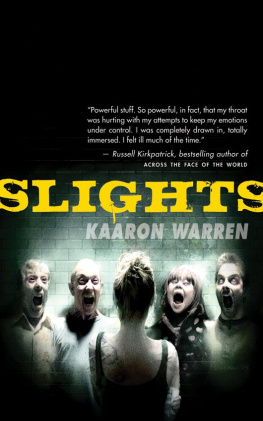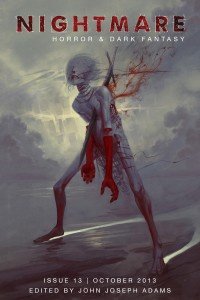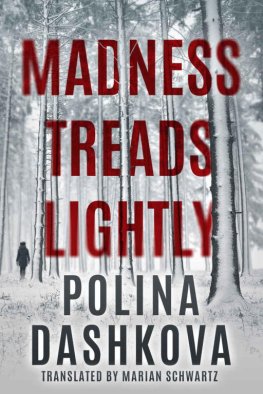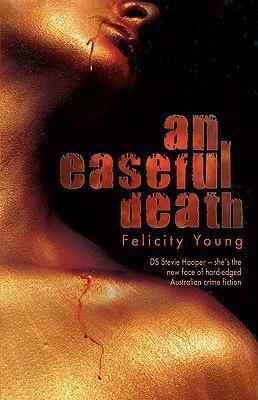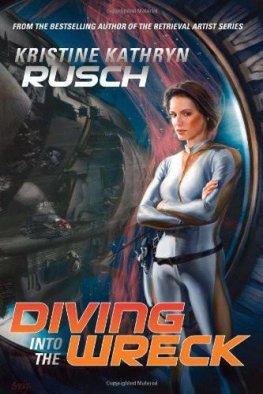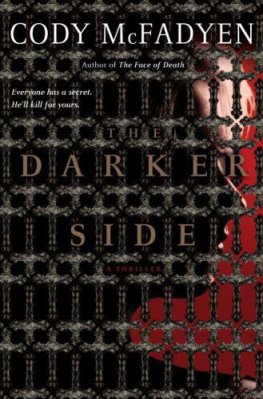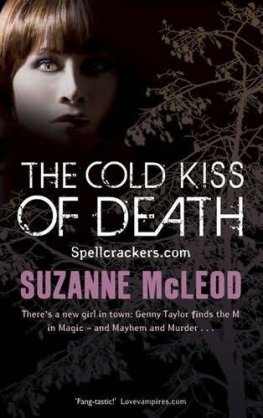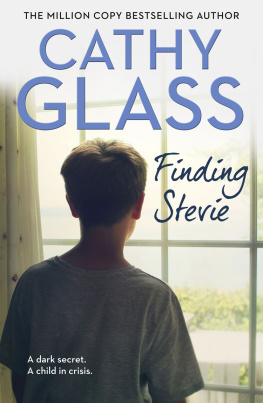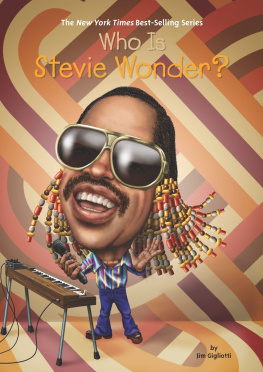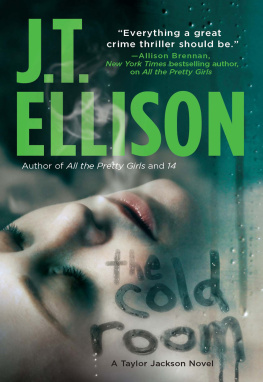KAARON WARREN
Slights

ANGRY ROBOT A member of the Osprey Group
Lace Market House,
54-56 High Pavement,
Nottingham
NG1 1HW, UK
www.angryrobotbooks.com
What do you see?
Originally published in the UK by Angry Robot 2009
Copyright 2009 by Kaaron Warren
Cover photo by Stefan Kopinski; design by Argh! Nottingham
ePub created by ePub Services dot Net
All rights reserved.
Angry Robot is a registered trademark and the Angry Robot icon a trademark of Angry Robot Ltd.
This is a work of fiction. Names, characters, places, and incidents are the products of the author's imagination or are used fictitiously. Any resemblance to actual events, locales, organizations or persons, living or dead, is entirely coincidental.
ISBN 978-0-85766-008-4
For Mitchell, Nadia and Graham,
because I said I would.
I envy Stalin. I wish I had the power to re-write history and my part in it. I would change so much. I would die only once, and I would not kill my mother. And my father would leave me a message; he would speak a meaningful sentence before going to work to be shot.
That would be my story, if I could change history.
at eighteen
What should have happened was this:
We got a taxi home.
This is what did happen:
We went out for lunch to spend Mum's lottery win she won just enough for a slap up meal. Food rich and creamy, chicken breast with camembert, salad with blue cheese dressing, a bottle of sweet wine, champagne, port.
We laughed and joked; talked loudly. Mum was in a good mood, not a nagging one. The waiter pretended we were sisters, and that made her giggle.
We just babbled on. We had no idea this was our last meal together.
"What do you think of my haircut?" I asked her.
"I wouldn't go back to that hairdresser, if I were you, Stephanie," Mum said. She had a fleck of parsley on her lip and when she talked it wobbled.
"I know. Stupid bitch. I said I wanted a change and she does this to me."
I had splurged and asked the hairdresser to give me a new style. She wanted to cut inches off, saying, "Once you pass eighteen, you have to be more careful."
I said, "Fine." How old did she think I was?
She snip snipped. Dark, wet entrails of my hair fell onto her thighs, criss-crossed the diamonds of her fishnet stockings. I couldn't take my eyes off her. The hairdresser said, "You know, you've got the sort of face which would suit a good red colour. You need a bit of a lift at the moment. Everything looks a bit flat. And maybe we should have a go at your eyebrows."
She was a very slim girl. Her hair was black, cut like a metal helmet. She wore a tight silver T-shirt, a thick corduroy skirt, the fishnet stockings. She sat in a rolling chair, travelling around my body like I was an island, snip snip. She spoke incessantly, complained of slight after slight.
She sighed. "Anyway, I'm sure you're not interested." I looked up from her thigh and she wasn't happy with me. She dried my hair without speaking, then held the mirror up for me to see.
I said nothing.
"Are you happy with that?" she said.
"You are kidding me," I said.
It shocked her. I suppose you're meant to lie. I paid her even though she made me look like a fucking bimbo. All this from a woman who told me, confidentially, that she thought reading novels wasn't smart because it's all just made up.
"What do you read?" I asked her.
"Oh, I love my magazines," she said. "I can read them over and over, there's always something different."
Mum laughed and called me a fibber.
"Oh, Stephanie. You're just trying to take attention away from your hair," she said.
"This is how the girl talks. I swear." I took a sip of wine and grimaced. Mum always chose sweet stuff. "We might as well drink lemonade," I said.
"Well, your hair is fine, really. You're just not used to looking pretty."
"Thanks a lot. I'll book you in, if you like."
That's what we talked about.
I joshed Mum about, paying her attention, making jokes about the waiter, who had terrible acne, and telling stories about other diners in the restaurant.
She said, "You sound just like your Dad. He used to whisper into my ear, telling the most outrageous tales. Should have heard what he told me about my father."
"What?" I didn't like to talk about my maternal grandfather, Joshua. He died when I was five, and I have a feeling he used to touch me; sometimes I get a glimpse of his face in my memory. It's shiny, a sucked lollipop, and very close to me. He was a grouch most of the time, generous and soft when you were alone with him.
"Come on, Mum, what did Dad say?" I passed her the plate of chocolates the waiter had laid on our table. They were dark, rich, and we planned to eat every one.
"He said that your granddad Joshua had affairs with everyone willing in town. Everyone." She covered her mouth. We didn't often talk about things like that.
"What, the men too?" I said, and she coughed in horror.
"You're a storyteller, just like your Dad was," she said. I knew that was true; Dad was a detective long before he joined the police force. I wondered if Dad's stories were ridiculous, or if they were true.
I dropped the keys on the way to the car. I've never been good with alcohol; a couple of glasses, still under the limit, and I'm screaming. Mum was giggling and muttering away, feeling no pain.
Feeling no pain.
I suddenly grew tired of it; being with her, pretending to be friends, enjoying her company. I drove quickly, wanting to drop her at home and go somewhere alone, somewhere I didn't feel like a fake. I should have called her a taxi and sent her home; that way, she would have been resentful, but alive.
"The car smells nice," she said.
"New leather in a can," I said. One of the best smells. I drove quickly. I thought I saw a child in the road and I swerved, my wheels spun and I lost it. I remember very clearly, though I said I didn't. I said I had no recollection; my head ached trying to remember.
But I remember my mother's arm coming across to protect me, hold me in my seat as if I were a child. My arms went over my face and head but I still cracked my skull.
I remember looking at her; she looked at me. She was terrified of death; more terrified of my death.
"Careful," she said, then we hit the wall.
This wall was only there to keep the sound of the highway from reaching the wealthy residents in the suburbs behind it. If the wall wasn't there, my mother may not have died. The papers loved it. "Wall of Death the quiet life versus the long life," all that.
I told people, especially Peter, that she died straight away, without a word. I told no one about where I'd been, that I'd smashed my skull and found myself in a cold, dark room full of people, faces familiar but beyond my tongue; I couldn't voice their names. The board I lay on was ridged with razors, sharp lines of pain down my back.
The faces came into focus. Some I knew; people I knew were there. Their eyes watered. They weren't blinking; that was it. They stared like zombies. I could smell them. They were so close now I could see the blood

